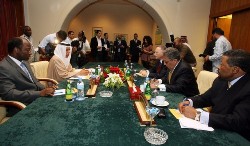Darfur rebel groups downplay significance of Doha talks
February 9, 2009 (PARIS) — A number of Darfur rebel groups have dismissed the importance of the Doha peace talks between the Justice and Equality Movement (JEM) with the Sudanese government.

The fiercest opposition came from the major rebel group that signed the Darfur Peace Agreement (DPA) led by Minni Minnawi.
“If the Abuja agreement was lacking then what is happening in Qatar is lacking even further….It is a major disaster” Minnawi told a news conference reported by the daily Akhbar Al-Youm.
“The Doha talks is a continuation of the scenario that I mentioned which is based on the claims by Khalil and his people that they are the only [power ] in Darfur and even in all Sudan” he said.
Last month Minnawi hinted to Sudan Tribune that Qatar among other countries are working to make JEM the major power in Darfur ahead of the peace talks.
“These countries are pushing Ibrahim to use force to become the main power in Darfur but this is impossible and will never happen” the leader of former rebel group Sudan Liberation Movement (SLM) said.
Minnawi’s forces have also clashed with JEM last month at the town of Muhajriya in southern Darfur.
In May 2006, the SLM signed the Darfur Peace Agreement (DPA) with the Sudanese government and its head Minnawi was appointed as the senior assistant of the Sudanese president in August.
But Minnawi have expressed frustration with implementation of the DPA saying the ruling National Congress Party (NCP) is deliberately stalling it.
The legacy SLM faction led by Abdel-Wahid Al-Nur said yesterday that the Doha talks aim at suspending the indictment of President Omer Hassan Al-Bashir by International Criminal Court (ICC) and to stop the expected arrest warrant for him.
“We reject this round of talks because it means to press the UN Security Council to defer the indictment of Al-Bashir and rescue the embattled president who is accountable for genocide in Darfur,” Al Nur said.
The ICC judges are expected to issue in the coming days an arrest warrant for President Al-Bashir who is accused since mid July 2008 by the chief prosecutor of genocide, crimes against humanity and war crimes.
Khartoum has been hoping that starting peace talks with the rebel groups would convince the UN Security Council (UNSC) to defer the ICC move against Bashir.
Another SLM faction which has recently split from its leader Ahmed Abdel-Shafi said in a statement that the Doha talks is “an attempt to mend fences between Islamists in Sudan”.
They also accused the joint African Union-United Nations mediator Djibril Bassole of being “biased” and “inexperienced” with regards to the Darfur conflict.
The JEM faction led by Idriss Ibrahim Azrag said that the talks are “doomed to fail without participation of all parties”.
“These talks will be a replication of Abuja agreement in a more frail form and will undoubtedly contribute to complicating the problem rather than solving it” the statement read.
The also accused the AU-UN mediator of having “suspicious links with Khalil Ibrahim movement”.
JEM walked out of negotiations with Sudan’s government during 2006 Abuja talks and boycotted efforts to restart negotiations in Libya in October 2007.
(ST)
